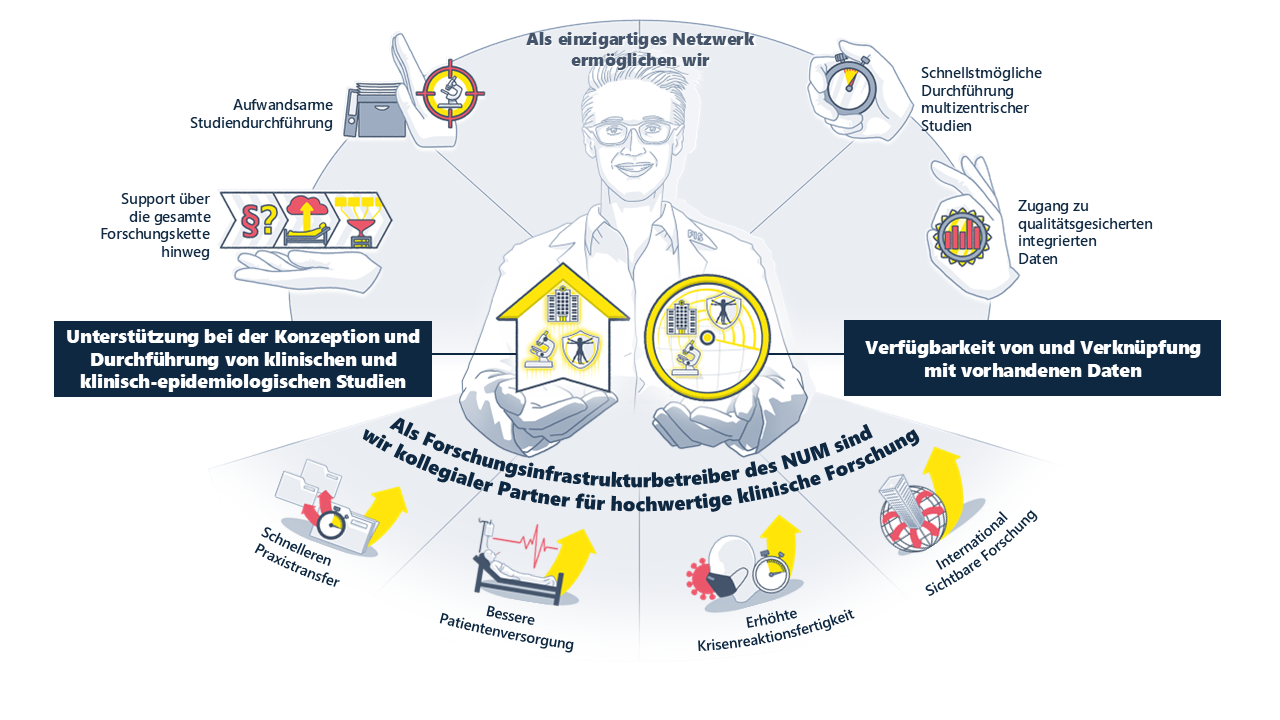Reseach Infrastructure at the NUM
NUM Reseach Infrastructures support researchers with methodological expertise, data management and high-quality research data
At the beginning of the COVID-19 pandemic, there was a widespread lack of the necessary platforms to collect and store treatment data and biosamples across institutions in a structured manner and make them available for use. For this reason, research and data infrastructures were either set up from scratch in several NUM projects (e.g. the NUM Platform for Imaging Data RACOON) or existing ones were expanded (e.g. NUM Clinical Epidemiology and Study Platform NUKLEUS).
As medical research data is extremely heterogeneous, there can be no "one size fits all" infrastructure solution for clinical research data. Accordingly, the NUM has set up Reseach Infrastructures for different types of data, different ways of obtaining data and different treatment settings. To ensure that these partial solutions complement each other optimally and are compatible at their interfaces, these platforms all work on the basis of the FAIR (Findable, Accessible, Interoperable, and Reusable) principles.
Implementation is in the hands of nationwide interdisciplinary expert networks, each of which contributes specific expertise on certain types of data (e.g. imaging data, autopsy data, emergency admission data) to NUM. The resulting NUM platforms are used by the NUM research projects and will also support researchers outside the NUM in their research projects in the future.
The NUM currently has the following Reseach Infrastructures, each with a different focus: NUM Study Network (NUM SN) | Specialty Network Infectious Diseases (SNID) | NUM Clinical Epidemiology and Study Platform (NUKLEUS) | NUM Platform for Imaging Data (RACOON) | NUM Platform for Autopsies and Pathology (NATON) | NUM Platform for Surveillance and Rapid Response (NUM-SAR) | NUM Data Integration Centres (NUM-DIZ) | NUM Platform for Acute, Intensive and Emergency Medicine (AKTIN) | NUM Methods- & Biosample-Hub (NUM-MB) | German Biobank Network (GBN). Others will follow in 2026.
A central task of the NUM is to provide these Reseach Infrastructures in the long term and to continuously develop them further. This includes the further expansion of the NUM platforms into a Germany-wide data space for all types of clinical research data. This should be widely available for use by the scientific community in line with the open science concept.
The NUM currently has the following Reseach Infrastructures, each with a different focus: NUM Platform for AKuT, Intensive Care and Emergency Medicine AKTIN | NUM Platform for Autopsies and Pathology NATON | NUM Clinical Epidemiology and Study Platform NUKLEUS | NUM Study Network (NUM SN) | NUM Data Integration Centres NUM-DIZ | NUM Platform for Imaging Data RACOON | NUM Methods & Biospecimen Hub NUM-MB | Specialist Network Infections (SNID) | NUM Platform for Surveillance and Rapid Response NUM-SAR | German Biobank Network (GBN). Others will follow from 2026.
A central task of the NUM is to make these Reseach Infrastructures permanently available and to continuously develop them further. This includes the further expansion of the NUM platforms into a Germany-wide data space for all types of clinical research data. This should be widely available for use by the scientific community in line with the open science concept.
Vision of the NUM FIS
"The Network University Medicine provides THE national research infrastructure with needs-orientated solutions for practice-changing health research. This Reseach Infrastructure creates optimal conditions for researchers, strengthens responsiveness and enables coordinated action."
A key component in realising this vision is the creation of a data room for clinical research data in Germany. In the future, this data room should contain all types of clinical research data. This applies regardless of whether it is data from routine clinical care or data collected in addition to routine documentation in clinical studies.
In order to realise this vision, the "Steering Committee of the NUM research infrastructures" was set up for the overarching management and further development of the NUM research infrastructures. It ensures that further infrastructure development is carried out by researchers for researchers and that the needs of research data users are taken into account as much as possible.













